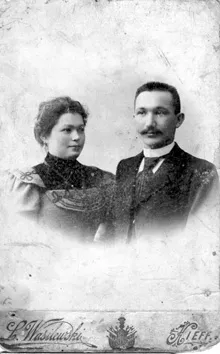Evgenia Wainshtock’s grandparents - Morduch Haitin and Riva-Haika Haitina
My grandparents - Morduch Haitin and Riva-Haika Haitina (nee - Gershovich) on their wedding anniversary I have no information about when my grandparents got married exactly.
My grandmother on my mother's side Riva-Haika Haitina, nee Gershovich, was born in Kiev in late 1870s. She didn't have any education, but she could read and write and knew many prayers by heart. All I know is that her parents lived in Mikhailovskaya Street (Editor's note: center of Kiev).
My grandfather on my mother's side Mordukh Haitin, born in 1875, came from the Baltic republics or Byelorussia. I have no information about his parents. He was a tailor. He was very professional and owned a shop (until mid 1920s). After his shop was expropriated he got a job at the tailor shop of Kiev military division.
I have no information about when my grandparents got married. They had five children: Sarah, born in 1900, 3 sons (my grandfather named them after his brothers) Aaron (1902), Gregory (1904) and Ilia (1906) and my mother Leibe born in 1908. My grandmother was a housewife. My grandparents rented a two-room apartment in a two-storied building in Bessarabka. The house was very solid -when a construction company took an effort to remove it in 1950s they failed and had to blast the foundations. There was my grandmother's bed in a bigger room, a sofa where I slept, my parents' bed, a cupboard and a table. There was a hallway with a wardrobe -my mother said that my grandfather also slept in the hallway. Another room -a smaller one- was given to my mother's brother Gregory and his wife Tatiana. My grandfather kept a housemaid. There was little space in this apartment, but nobody seemed to care much about it. There was a kerosene storehouse and a shoihet in the yard. We had Ukrainian, Russian and Jewish neighbors. They all and non-Jews too took their chicken to the shoihet to get them slaughtered. Neighbors got along well with one another. Also other Jews from nearby streets came to this shoihet.
There were many books by Russian and foreign writers at my grandparents' home. All members of the family were fond of reading newspapers -especially "Pravda". One day in 1920s Aaron came home from work, sat at the table and began to read a newspaper. Grandmother served his dinner and he ate it without noticing. Grandmother cleaned up the table and then he finally raised his eyes from the newspaper asking her "how about dinner, Mother?"
My grandfather sympathized with Bolsheviks. If I said "God, it is going to rain" before 1 May (Editor's note: The Day of International Solidarity of Workers) or 8 March (Editor's note: International Women's Day) he replied "Don't you worry. Bolsheviks are lucky and will enjoy good weather!". My grandfather told me about oppression of Jews in old times. He said how groups of men on Palm Day used to beat Jews with willow tree branches before the revolution. He didn't tell me anything about pogroms.
My grandparents were very religious and observed all Jewish traditions. My grandfather went to synagogue regularly. He had a thales and book of prayers and prayed at home every day with his tefillin on. My mother told me that my grandmother put on a black gown, a shawl and a thick gold chain (her wedding gift) before going to synagogue every Saturday. My grandfather had a seat of his own at Brodsky synagogue. After the war grandfather went to synagogue at Podol. Their children were not religious and didn't go to synagogue. In 1930s religious people were persecuted . At Pesach all children and their families got together at the table in their parents' home. At Pesach my grandparents used special fancy dishes and table sets. I remember potatoes with prunes - I couldn't stand the smell of them. There was matsah at Pesach. My grandparents talked in Yiddish. My grandfather spoke good Yiddish while my grandmother spoke a mixture of Yiddish, Ukrainian and Russian. My grandfather spoke Russian with his customers. My grandfather was a very professional tailor, but he drank, unfortunately. My grandfather worked as a tailor before the revolution of 1917. Between 1930s - 1941 he made clothes for commanding officers of Kiev military division.
My grandfather and grandmother managed to evacuate from Kiev in 1941. They reached Georgievsk and moved on to Samarkand, Middle Asia, in 3000 km from Kiev. It was very hot there. There was lack of potable water and plenty of fruit and vegetables and no water to wash them. Epidemics were a usual thing. In 1943my grandmother died in Samarkand of some infection. She was buried at the Jewish cemetery in Samarkand. There was a big Jewish community in Samarkand. My grandmother went to the synagogue and celebrated holidays when he could manage. In 1945 grandfather returned to Kiev. He was a pensioner and went to synagogue every day and spent all his time reading religious books. We didn't see each other often. In 1950 my grandfather died. He called my father before he died. We buried him at the Jewish cemetery in Kurenyovka according to the Jewish ritual. It was a tradition to read a prayer for forty days after somebody died. (Editors note: 40-day mourning is a Christian tradition. I guess, she may have mixed things up). It was to be done by older sons, but they didn't know any prayers and we had to pay and an old man said prayers at the synagogue.










